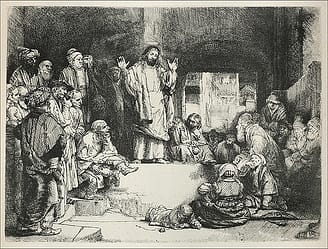We have come to the end of our brief investigation into the Biblical definition of holiness. We discovered that it is, first of all, a theological term describing God’s nature (here). Then it becomes a redemptive term describing the results of God’s saving grace (here and here). Finally, it is a sanctifying term characterizing the ethical goal of a life in relationship with God (here).
But here is where a problem arises.
Any reflective, self-aware believer will quickly recognize that the Lord’s command “to be holy as I am holy” sets an impossible standard, even for the most scrupulously attentive disciple. The distance separating vision from reality could not possibly be greater. Who in their right mind would ever claim that they are living such a morally pure existence that they are as qualitatively distinct from the world around them as the eternal, Creator God is distinct from his temporal Creation?
The Old Testament addressed this issue straight on. It was the rationale  behind God’s instructions for animal sacrifice. Leviticus 17:11 says,
behind God’s instructions for animal sacrifice. Leviticus 17:11 says,
“For the life of a creature is in the blood, and I have given it to you to make atonement for yourselves on the altar; it is the blood that makes atonement for one’s life.”
A sacrifice of atonement covered or expunged the guilt created by one’s failure perfectly to obey.
God’s people were expected sincerely to do their best in obeying the law of the covenant. But knowing full well that no one could keep the law perfectly, God provided a variety of sacrifices (not only animal but vegetable sacrifices such as first-fruit offerings) in order “to cover over” – to make atonement – for the people’s failings.
Offering these proscribed sacrifices, as they were instructed, was also a part of what it meant for Israel to be a holy people. So, every Israelite was to take God’s word seriously. Obey the law as fully as possible. Not taking it lightly. Which included making regular sacrifice as a confession of one’s failings, recognizing the need for God’s forgiveness.
This is the Old Testament prescription for “being holy as Yahweh is holy.”
When we get to the New Testament, both the law and the sacrifices of the Sinai covenant have been fulfilled, completed, realized and thus brought to their conclusion in Jesus of Nazareth. (Obviously, there is a lot to be discussed here, but that is for another post or two or three).
Jesus’ life fulfilled the Old Testament law of the covenant (Matthew 5:17-20, compare 24:35), while his death became the ultimate, atoning sacrifice (Matthew 26:27-28, compare Exodus 24:8; Mark 10:45). This is both the consistent teaching of the New Testament and the historic theology of orthodox Christianity. Thus, by fulfilling the old covenant Jesus inaugurated the new covenant.

Nevertheless, there is a curious stream of continuity flowing from the old into the new: namely, the seeming impossibility of fully obeying Jesus’ requirements for his disciples.
Here is only a brief sampling:
If you even speak badly of someone, you are guilty of murder.
If you lust after another person, you are guilty of adultery.
If someone hits you on the right cheek, let him hit the other one too. Never seek revenge or go to court.
Love your enemies and pray that your heavenly Father will bless them.
Give to anyone who asks and be so generous that you can’t keep track of where your giving goes (Matthew 5:21 – 6:4).
If you do not hate your immediate family and even your own life (in comparison to your devotion to me), you cannot be my disciple (Luke 14:26-27).
If you do not give up everything you have, you cannot be my disciple (Luke 14:33).
The apparent impossibility of living out Jesus’ instructions is the reason several Christian traditions have devised different ways of avoiding the literal intent of Jesus’ words.
Some suggest that Jesus intended there to be two different types of disciples. One, like priests and nuns, who will obey his teaching literally. And another, sometimes called laypeople, who are free to adhere to a lesser standard.
Others find creative ways to reinterpret Jesus’ words so that they don’t actually intend what they appear to say. I criticize this way of dealing with
It’s true that Jesus’ teaching is rigorous. It’s also true that no one, not even monks and nuns who take vows of poverty, can follow Jesus’ teachings perfectly. We can see this in the gospels themselves as the devoted disciples who live with him every day are periodically rebuked and corrected for their failures and misunderstandings.
If you want to read a fine discussion of this dynamic, I recommend taking a look at Richard Burridge’s book, Imitating Jesus: An Inclusive Approach to New Testament Ethics (Eerdmans, 2007). Burridge provides a thorough look at the many ways in which the theme “impossible expectations – 
Jesus’ words are hard, but his behavior is merciful. He asks for the impossible and then extends compassion with forgiveness. Burridge notes:
“His [Jesus’] demanding ethical teaching was delivered in the context of keeping company with outsiders and sinners, those who had ethical difficulties, yet he seems to have accepted them, ate and lived with them – which leaves us with the challenge of how imitating him requires New Testament ethics to be done within an inclusive community.” (page 179 and throughout)

Jesus’ resurrected life is the gift that keeps on giving.
He still requires that we follow him; that we obey his impossible words, conform to his perfect life, and imitate The One beyond imitation.
And when we fail, which will happen frequently, our perfectly holy Lord Jesus will be there every time to pick us up, to forgive us, brush us off and provide the encouragement we need to give it another try.
That’s what it means for a true disciple to be holy as the one and only Son of God is holy.
